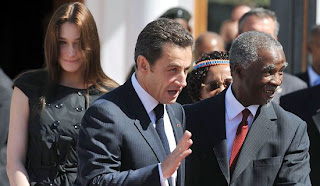 CAPE TOWN, South Africa: French President Nicolas Sarkozy announced a major overhaul of his nation's policies toward Africa on Thursday, saying that its military agreements were outdated and it had no interest in keeping its forces permanently on the continent.
CAPE TOWN, South Africa: French President Nicolas Sarkozy announced a major overhaul of his nation's policies toward Africa on Thursday, saying that its military agreements were outdated and it had no interest in keeping its forces permanently on the continent.Sarkozy told the South African parliament that he would re-negotiate all defense agreements dating back to the end of the colonial era in the 1960s. France is often accused of propping up dictators and ignoring cronyism and corruption in its former colonies in Africa. In future, relations would be more open and transparent, Sarkozy said.
"Defense agreements must reflect the Africa of today and not yesterday," he said.
"It is unthinkable that the French army should be drawn into domestic conflicts," said Sarkozy, who was elected in May. He said the new policy marked a "major turning point."
"It is unthinkable that the French army should be drawn into domestic conflicts," said Sarkozy, who was elected in May. He said the new policy marked a "major turning point."
France has 9,000 troops at its bases in Djibouti in the Horn of Africa, and Senegal and Gabon in the west, and serving in operations in Ivory Coast, Chad and Central African Republic. It also has a military base in the Indian Ocean island of La Reunion.
A French defense ministry official in Paris said no decision had been made on whether to close bases. He spoke on condition of anonymity as he wasn't authorized to speak publicly.
Presidential aides said the re-negotiation of France's defense accords would involve eight African countries.
Presidential aides said the re-negotiation of France's defense accords would involve eight African countries.
South African President Thabo Mbeki said Sarkozy's stance would help speed the "completion of decolonization of the continent."
In Ivory Coast, where France has 2,400 troops, there was a muted reaction, with government officials saying Sarkozy must first consult with affected nations.
"I am skeptical ... I am waiting to see if there is any concrete action," said Maurice Fero Bali, editor-in-chief of the government daily "Fraternite Matin."
"We, Africans, are still waiting to see this change that Nicolas Sarkozy announced during his campaign. The reality in Chad, where France defended the regime of (President Idriss) Deby is disillusioning," he said.
In Senegal, political analyst Babacar Justin, who specializes in defense issues, said that 40 years after Senegal's independence, the French base in his country was an "anachronism." But he said it will be hard for France to completely relinquish its base in Senegal, which for years was the capital of France's colonial empire.
Alioune Tine, the president of one of the largest human rights organizations in Senegal, called the continued French presence in his country "a scandal for Africa."
Sarkozy arrived in South Africa after a brief stopover in Chad, an oil-rich, coup-prone former French colony that has never known real democracy. When rebels besieged Chad's capital earlier this month, French forces gave logistical support to the government, including transporting munitions from Libya and protecting the airport.
But Sarkozy emphasized that he did not authorize French troops to get involved in the fighting or shoot any Africans and said this was "unprecedented" and indicative of future policy.
Sarkozy said that in future France also wanted to pay greater attention to human rights and democracy, singling out Ivory Coast, Chad and Zimbabwe.
"Africa must take on its own security issues and problems," he said. Policing was a role for the African Union and regional African organizations, and France would help those organization play a more active decisive role in peacekeeping, the French leader said.
Sarkozy also announced an initiative to mobilize €2.5 billion (US$3.8 billion) in new investment in sub-Saharan Africa over the next five years. He said this would finance 2,000 companies and help create 300,000 new jobs.
The French leader stressed that the country's relationship with South Africa, never a French colony, should serve as a model for the new African relationships.
Sarkozy is accompanied by 40 French business leaders including chief executive officer Ann Lauvergeon of AREVA, which built South Africa's Koeberg nuclear power plant and has bid against a consortium led by Westinghouse Corp. of the United States to build a second one.
Sarkozy said he would send a team of French engineers in the coming days to try to help South Africa overcome an acute energy shortage, but stressed that this was unrelated to the AREVA bid.
__
Associated Press writers Christine Ollivier in Cape Town, Parfait Kouassi in Abidjan, Ivory Coast, Sadibou Marone in Dakar, Senegal and John Leicester in Paris contributed to this report






No comments:
Post a Comment